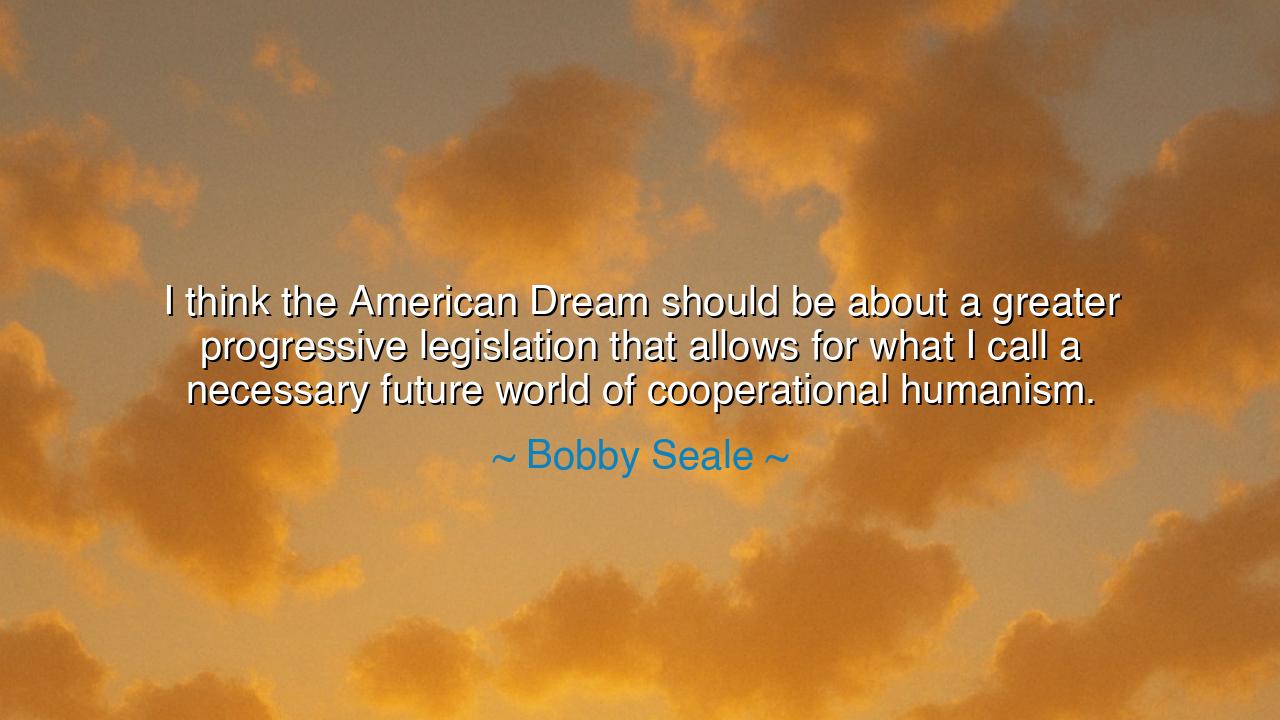
I think the American Dream should be about a greater progressive
I think the American Dream should be about a greater progressive legislation that allows for what I call a necessary future world of cooperational humanism.






"I think the American Dream should be about a greater progressive legislation that allows for what I call a necessary future world of cooperational humanism." These powerful words from Bobby Seale speak to a vision of the American Dream that goes beyond personal success and material gain, and towards a society where human cooperation and progressive legislation shape the future. Seale, one of the co-founders of the Black Panther Party, calls for a dream that transcends individualism and strives for the collective good. His vision of a "necessary future world" challenges us to reconsider what it means to dream, to succeed, and to live in a society that truly serves the well-being of all its members.
The ancients too pondered the nature of society and the greater good. In the writings of Plato, particularly in his work The Republic, the philosopher proposed a society where each individual plays a role according to their abilities, and where justice is not a matter of individual gain, but the flourishing of all. Plato’s ideal city was one of cooperation, where the leaders and the people worked together for the common good. Just as Plato imagined, Seale’s vision calls for a society that is built on progressive principles, where humanism, or the respect and dignity of all people, is the guiding force behind legislation. This is not a dream rooted in competition, but in collaboration—a vision where society elevates its members through unity and shared responsibility.
The concept of cooperative humanism reflects an ideal seen throughout history, but most notably during times of social upheaval. Mahatma Gandhi, in his pursuit of independence for India, emphasized the importance of cooperation among all people, transcending social classes, religions, and backgrounds. Gandhi’s vision for India was rooted not in violent rebellion, but in nonviolent cooperation, where each individual played a part in the collective struggle for freedom. His belief in the dignity of every human being was the core of his philosophy, much like the vision of cooperational humanism proposed by Seale. Just as Gandhi sought a unified India, Seale’s call is for a unified America, where progressive legislation works to bridge the divides that separate people and elevate them to a higher plane of mutual respect and opportunity.
Consider also the rise of the civil rights movement in America, where figures like Martin Luther King Jr. called for social justice not just through legal reforms but through a shift in the collective conscience of the nation. King’s dream was not just about equality under the law, but a deeper, more profound transformation—a society where cooperation and humanism replaced division and hate. His famous speech, “I Have a Dream,” is a call for a future where people are judged not by the color of their skin, but by the content of their character. King’s vision, like Seale’s, centered on progressive legislation—but also on a societal shift that would allow all people to live with dignity, respect, and freedom. This collective dream calls for unity, for a world where humanism guides the actions of all.
Seale’s call for a "necessary future world" speaks to the urgency of shaping a society that reflects the values we wish to pass down to future generations. The idea of cooperation among all people—not just in times of crisis but as a regular part of daily life—is a powerful one. It challenges the traditional notion of the American Dream, which has often been defined by the pursuit of personal wealth and individual success. Instead, Seale asks us to redefine the dream, placing cooperation at its heart. In this new vision, true success is not about accumulating wealth, but about building a world where all people are given the opportunity to thrive.
The lesson Seale offers is one of hope and responsibility. His vision calls us to consider what kind of future we want to create—not just for ourselves, but for the entire human race. This is a call to action for those who seek to leave a lasting legacy, not of individual triumph, but of collective prosperity. To truly work towards a better world, we must embrace the ideals of cooperation, equality, and humanism in all our actions. Seale’s quote urges us to recognize that while individual effort is important, true progress comes when we work together as one people, united by a common purpose.
In our own lives, we can apply Seale’s wisdom by focusing on building stronger communities, fostering cooperation, and pushing for progressive change that benefits everyone. Whether in the workplace, in our families, or in our political systems, we must ask ourselves how we can contribute to the common good. Just as Seale advocates for cooperation and humanism, we must ensure that our actions and decisions reflect these values. By focusing not just on individual success but on the well-being of all, we can create a future where everyone has the opportunity to live with dignity and respect, regardless of their background or circumstances.
Let us carry forward Seale’s call for a "necessary future world"—one where cooperation and humanism shape the future we leave for the next generations. It is through collective action, rooted in shared values, that we can create a world that reflects the best of humanity.






AAdministratorAdministrator
Welcome, honored guests. Please leave a comment, we will respond soon